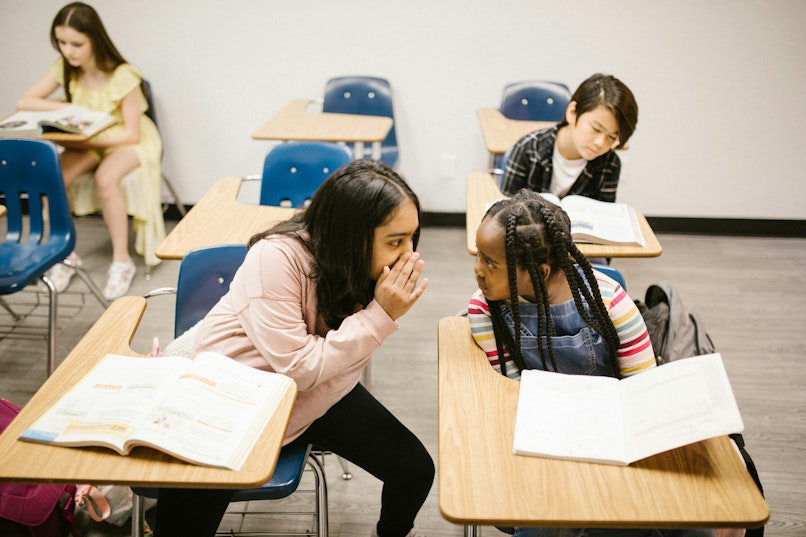1 in 2 teen girls keep period talk to close friends and family
Exploring period stigma in 2026

Updated January 7, 2026
In this article
It’s 2026 – and yet, for many teen girls, periods are still something to be whispered about.
In a luna poll of 2,229 girls, nearly half (47%) said they’re only comfortable talking about their periods with close friends or family.
Just 1 in 5 (21%) said they’re completely at ease discussing periods more openly, while almost a third (30%) admitted they feel embarrassed, uncomfortable, or would rather keep it private.
For something that happens to half the population, that’s still a lot of silence.
Of 2,516 girls polled, more than half (57%) said they got their first period at age 11 or 12 – 1 in 8 girls (13%) say they got their first period at age 10 or younger.
Despite growing awareness, periods can still be a sensitive or uncomfortable topic in school and social settings which can make them trickier to manage.
While many teachers and schools do their best, 72% of girls (of 2,001 polled) said their school’s period education could be improved, and 1 in 8 (13%) said they hadn’t had any period education at school at all by the time they started periods.
This lack of open conversation can have real consequences, for example fear around what's happening to their body when a first period starts, or worry around using communal toilets for safe period changes which means not changing a product when needed.
In a poll of 2,445 girls, 51% said their period affects their plans
Many teen girls say they end up cancelling activities or struggling through them.
Many are not aware that periods shouldn’t be so heavy or painful that they stop them from attending school, which explains why more than 3 in 5 girls (62%) say they’d feel frustrated or embarrassed if they had to get a doctor’s note to explain an absence due to period pain.
Doctor Katie Malbon, luna’s Chief Medical Advisor and General Paediatric Consultant said of this:
“In clinic, I regularly see girls who’ve been putting up with heavy, painful, or irregular periods without saying a word – often because they think it’s just something to deal with quietly.
The shame and silence around menstruation means many don’t realise what’s normal and when to ask for help.
Creating safe spaces for honest, judgement-free conversations is key to protecting both their physical and mental health.”
Why talking about menstruation matters
Periods aren’t just a biological process – they’re also deeply tied to how girls feel about their bodies, identity, and health.
When the message is to hide or downplay them, shame can creep in.
Before joining luna, many girls turned to the internet to fill in the gaps.
In a poll of 1,732 girls, 1 in 4 (25%) said they learned about periods from social media.
By contrast, only 14% said they got most of their period education from a teacher.
That’s why stigma-free education matters – not just for biology lessons, but for mental health, confidence and self-advocacy.
luna’s Co-Founder, Jo Goodall, had a similar experience growing up – which is one of the many reasons she founded the app with Co-Founder Jas Schembri-Stothart:
“When I was growing up, periods were barely talked about – and when they were, it felt incredibly awkward.
I remember learning from unverified magazines and playground rumour, never really knowing what was true or who to trust.
That’s one of the big reasons we created luna: to give girls a space we wish we’d had growing up – where they can get answers, feel understood, and know there’s nothing embarrassing about what their bodies are doing.
The proliferation of social media means that’s where teens go now as its so easy to access, so we created a space that they can turn to for trusted education.”

What can help teens talk more openly about periods?
The good news is: this is a fixable problem.
And schools, families, educational platforms, and friends all have a role to play.
- Normalise the word “period” or “menstruation”: speaking plainly about it helps remove the awkwardness, no more “Aunt Flo” please!
- Start early, and make it ongoing: talking about periods shouldn’t be a one-time “talk” – repetition builds confidence and helps to normalise things
- Subsidise period education: alongside relying on lessons at school, try to have conversations at home to fill in any education gaps or introduce them to safe platforms to help them learn, like the luna app
- Support their practical needs: access to free products and flexibility around PE or absences helps girls feel supported and less anxious

It’s time to talk about periods
There’s nothing embarrassing about periods. But silence can make them feel that way.
Talking about periods, even about our own experiences, can give girls the message that their experiences matter, and that there’s no shame in being real about their bodies.
How we created this article:
luna's team of experts comprises GPs, Dermatologists, Safeguarding Leads and Junior Doctors as well as Medical Students with specialised interests in paediatric care, mental health and gynaecology. All articles are created by experts, and reviewed by a member of luna's senior review team.
We'd love to keep in touch!
Sign up to our parent newsletter for emails on the latest teen trends, insights into our luna community and to keep up to date
By signing up, you are agreeing that we can use your email address to market to you. You can unsubscribe from marketing emails at any time by using the link in our emails. For more information, please review our privacy statement.